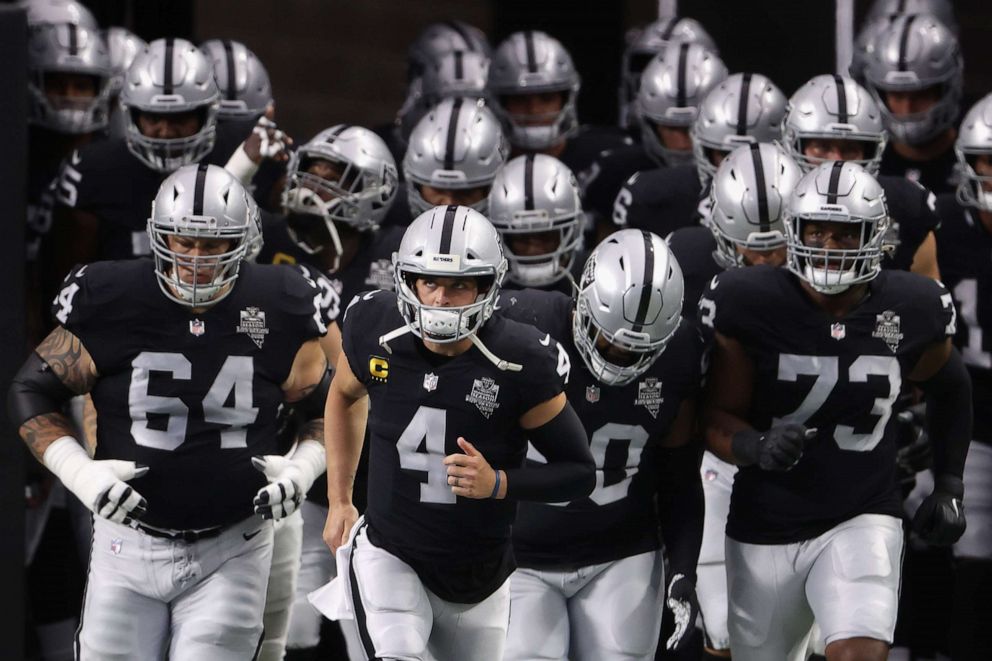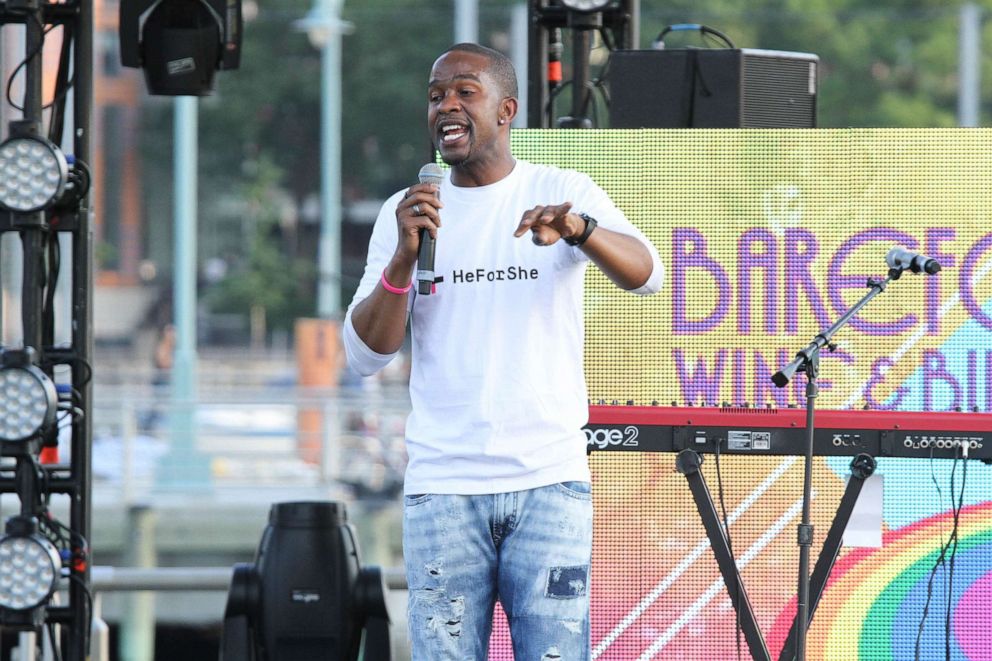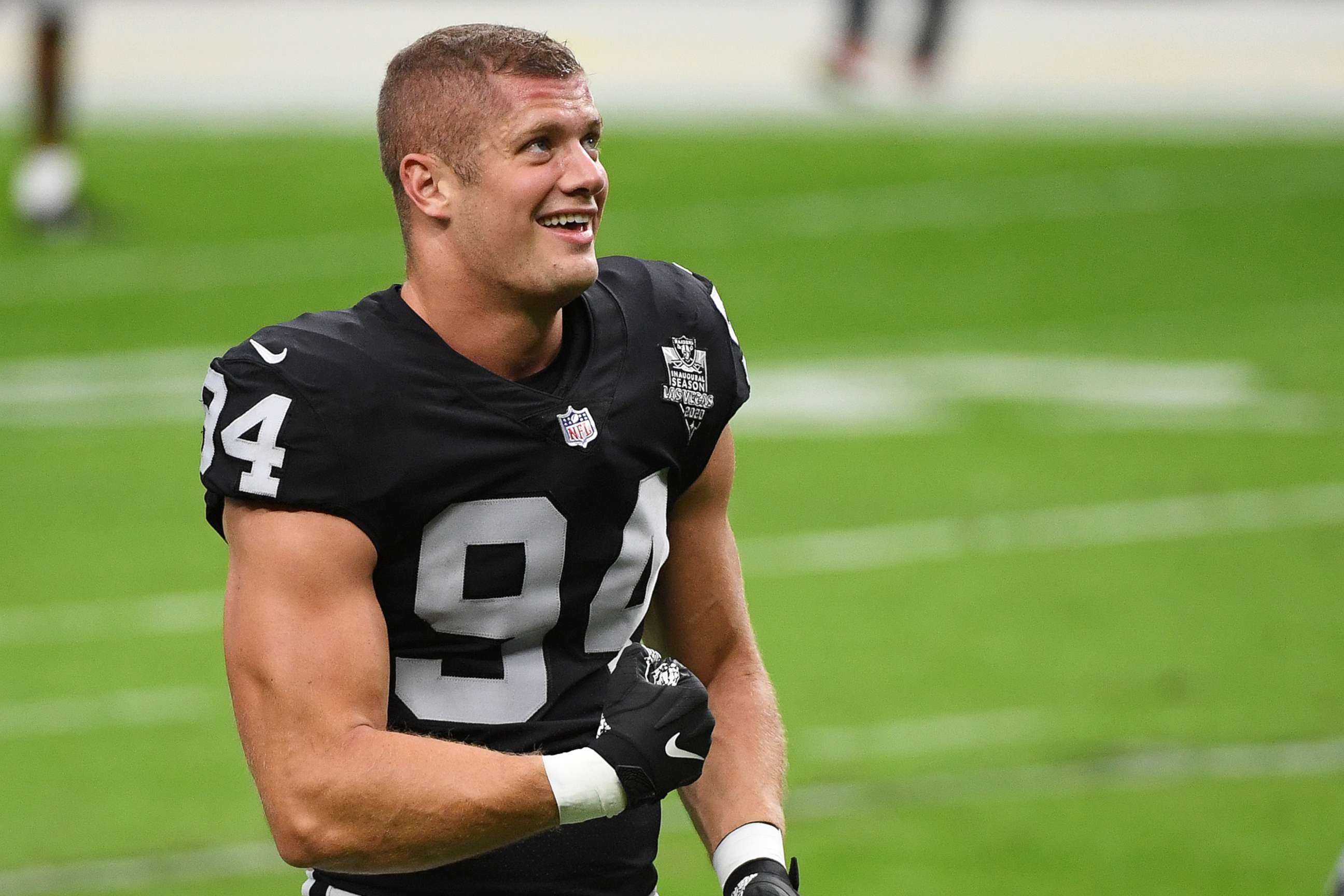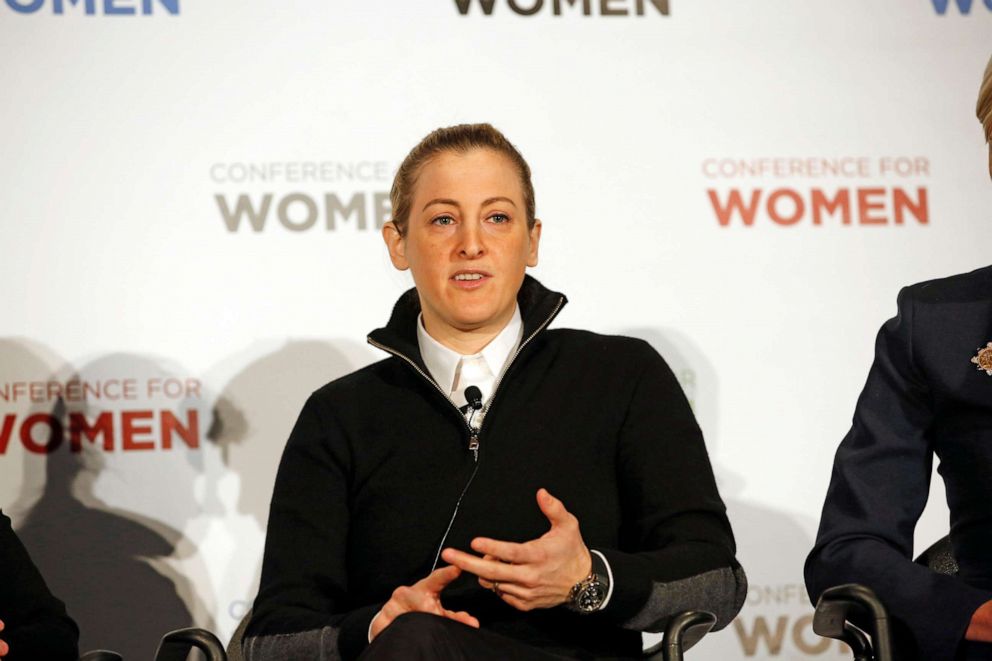Carl Nassib's coming out signals shift from toxic masculinity, homophobia in sports, advocates say
The Las Vegas Raiders' Carl Nassib came out as gay in an Instagram video.
Las Vegas Raiders defensive end Carl Nassib made history as the first openly gay active NFL player when he came out on social media. In a June 21 Instagram video, the 28-year-old said he finally felt comfortable enough to get the news off his chest.
"I just think that representation and visibility is so important," Nassib said. "I'm going to do my best and do my part to cultivate a culture that's accepting, that's compassionate and I'm going to start by donating $100,000 to The Trevor Project."
Messages of support from Nassib's teammates, colleagues and the NFL flooded social media -- and the league promised to match Nassib's $100,000 donation to the Trevor Project, a nonprofit organization focused on suicide prevention efforts for LGBTQ youth.

But the history-making moment sparked the question -- why did it take so long for an active player to come out? Homophobia, a "locker room" culture of toxic masculinity and the shifting national opinions on the LGBTQ community may have contributed, advocates say.
"Every time an athlete comes out, it sends a really powerful message," said Joanna Hoffman, the communications director at Athlete Ally, an LGBTQ athlete advocacy group. "Not just to other athletes who are closeted but to these leagues as a whole -- that they have work to do to make sure that they are investing in a culture that makes it so that more athletes can come out."
Nassib isn't the first gay NFL player. Several retired players, like Wade Davis, Esera Tuaolo, and Ryan O'Callaghan, came out as gay after leaving the field for good. Some criticized the culture of the NFL, their teams and the sport for keeping them from coming out while in the league.
"Locker room" culture, which often refers to sexist or homophobic jokes and language used among some men, and homophobia itself were common threads among their stories.
"I remember being at practice and you're just so hyper-vigilant of everything that you do because there's a certain type of macho that one knows that they have to perform in order to attempt to be accepted," Davis, a former NFL star, told NPR.
At the National Gay Flag Football League, commissioner Shigeo J. Iwamiya said that many of their players have self-selected out of regular sports teams because of a toxic culture in their teams.

Iwamiya cited homophobic slurs and language, stereotypes of gay men as being weak, or the sexualization of gay men as reasons. He said that LGBTQ people are often made to feel like a target or a nuisance in locker rooms and other private settings.
"People feel like, 'somebody's checking me out or somebody's watching me,'" Iwamiya said. "There seems to be the perception of fear of -- 'somehow you're threatening to me in some way shape or another if you come out.'"
This fear from many non-LGBTQ people can lead to discrimination and violence, advocates say.
According to a 2020 report by the University of California, Berkeley, roughly one-third of football players in the study had negative attitudes toward gay men and homosexuality.
All of the participants in the study identified as straight, and researchers noted the heteronormative attitude of football student-athletes when compared to the general student body at this institution.
To move forward, Hoffman said that allies are key to creating a safe environment for people to feel that they can come forward and come out.
"The burden can't just be on the people who are being discriminated against, to be the ones to speak out," Hoffman said. "We need everybody to be speaking out if we're going to change society and change the culture for the better."

Hoffman also said that the NFL and other sports leagues need to take responsibility for the role they serve in helping people come out. "It's really up to coaches, to fellow players and to leagues to be making sure that they are proactively incorporating policies that institutionalize safety for LGBTQ players," she added.
Among the general population, acceptance of the LGBTQ community is growing.
The Pew Research Center reports that 72% of people say "homosexuality should be accepted in society," which is up about 20 percentage points since 2002. And 5.6% of U.S. adults say they identify as lesbian, gay, bisexual, or transgender, according to a Gallup survey.
Sam Rapoport, the NFL's senior director of Diversity, Equity and Inclusion, said the league is catching up -- and that the outpouring of support for Nassib shows that it's on the right track.
"If you have the captains of your team saying, 'That's incredible. We got you --' You have to believe that in the locker room, any type of homophobic language or slurs is just not going to be accepted," Rapoport said.
"The teams follow their elite players and they set the tone so it's incredible to see people like Saquon [Barkley] and J.J. [Watt] and Julian Edelman and others really step up and support Carl publicly," Rapoport added.

NFL Commissioner Roger Goodell announced the donation match to the Trevor Project and committed to efforts around diversity, equity and inclusion.
"The NFL family is proud of Carl for courageously sharing his truth today," Goodell said in a statement. "Representation matters. We share his hope that someday soon statements like his will no longer be newsworthy as we march toward full equality for the LGBTQ+ community. We wish Carl the best of luck this coming season."
Advocates, like Hoffman, are optimistic about what this will mean for athletic leagues across the country. However, there's still a lot of work to be done, she cautioned.
"Sports is more than just a hobby or a pastime for many of us," Hoffman said. "It's a critical outlet, and having access to the sports that we love is part of our human rights and it's something that everyone deserves to be able to access in a safe and inclusive way."




